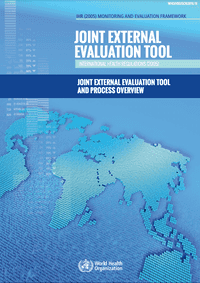
Languages: English, Spanish, French... (4)
Joint External Evaluation
[JEE]
The JEE is a voluntary evaluation of countries' IHR capacity. It expose gaps in Public Health systems that can then be prioritized for action by governments and funders. The JEE is coordinated by regional WHO offices and consists of a self-assessment and an external evaluation.
SUMMARY
The Joint External Evaluation (JEE) is a framework for monitoring a country’s capacity under the 2005 International Health Regulations (IHR). The JEE is a voluntary and collaborative process that assesses countries within the IHR framework to prevent, detect and respond to public health threats, whether they are natural, accidental, or deliberate. The JEE is designed to expose a country’s shortcomings so that they can prioritize developing their public health infrastructure to close the most critical gaps. The JEE process consists of a self evaluation and external evaluation by experts in other countries and WHO, WOAH, and FAO staff. At the end of the JEE process, countries are given a score which serves as their baseline for improvement.
Originally, IHR implementation was measured exclusively from self evaluation by countries; in 2015, the World Health Assembly recommended that a peer review process be added to the self evaluation, and the two components together make up the JEE process. The JEE was developed to support related efforts such as the World Organization for Animal Health’s (WOAH's) Performance of Veterinary Services (PVS) Pathway, the Global Health Security Agenda and the World Bank Group. The JEE promotes transparency and mutual accountability, therefore JEE scores and reports are made publicly available upon completion.

..png)
